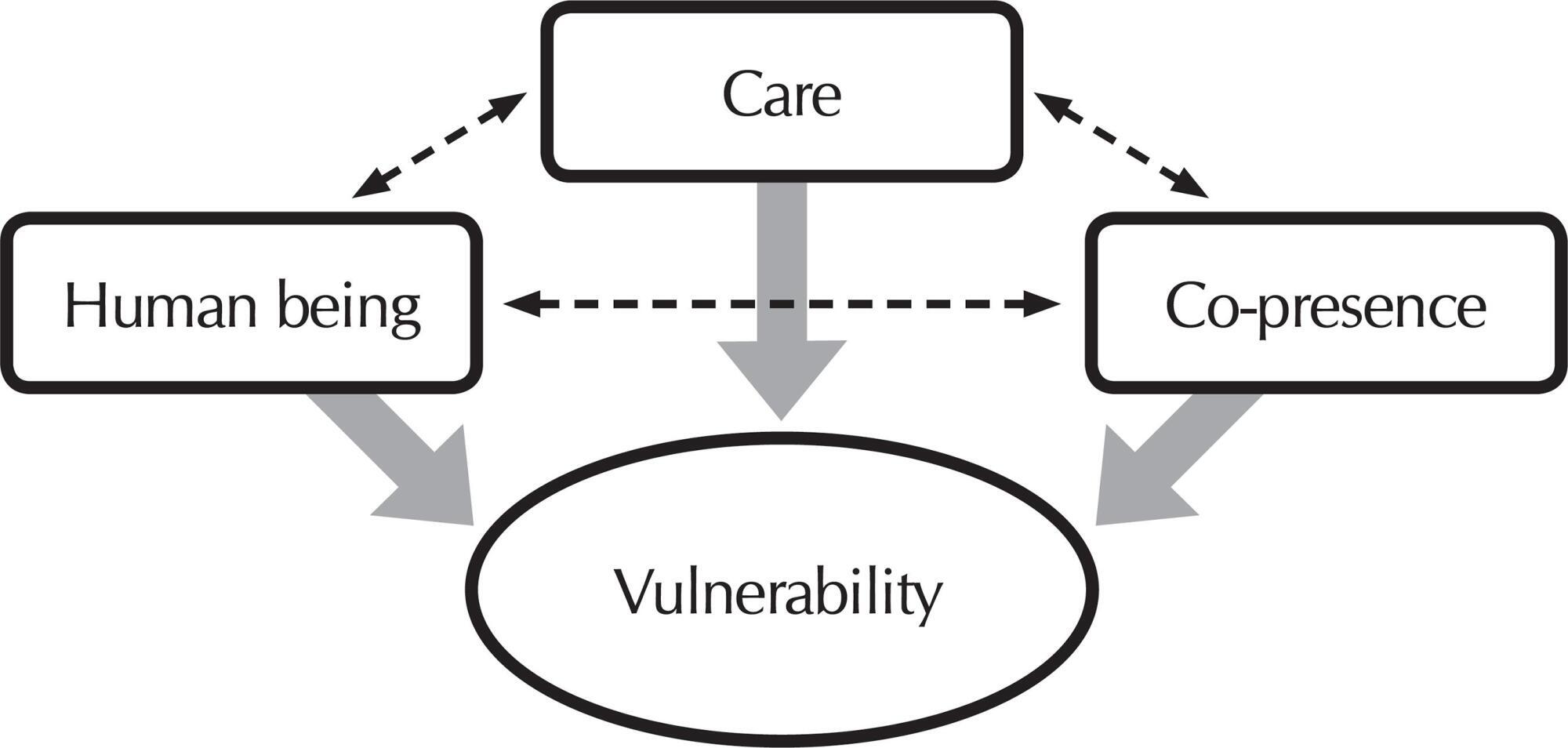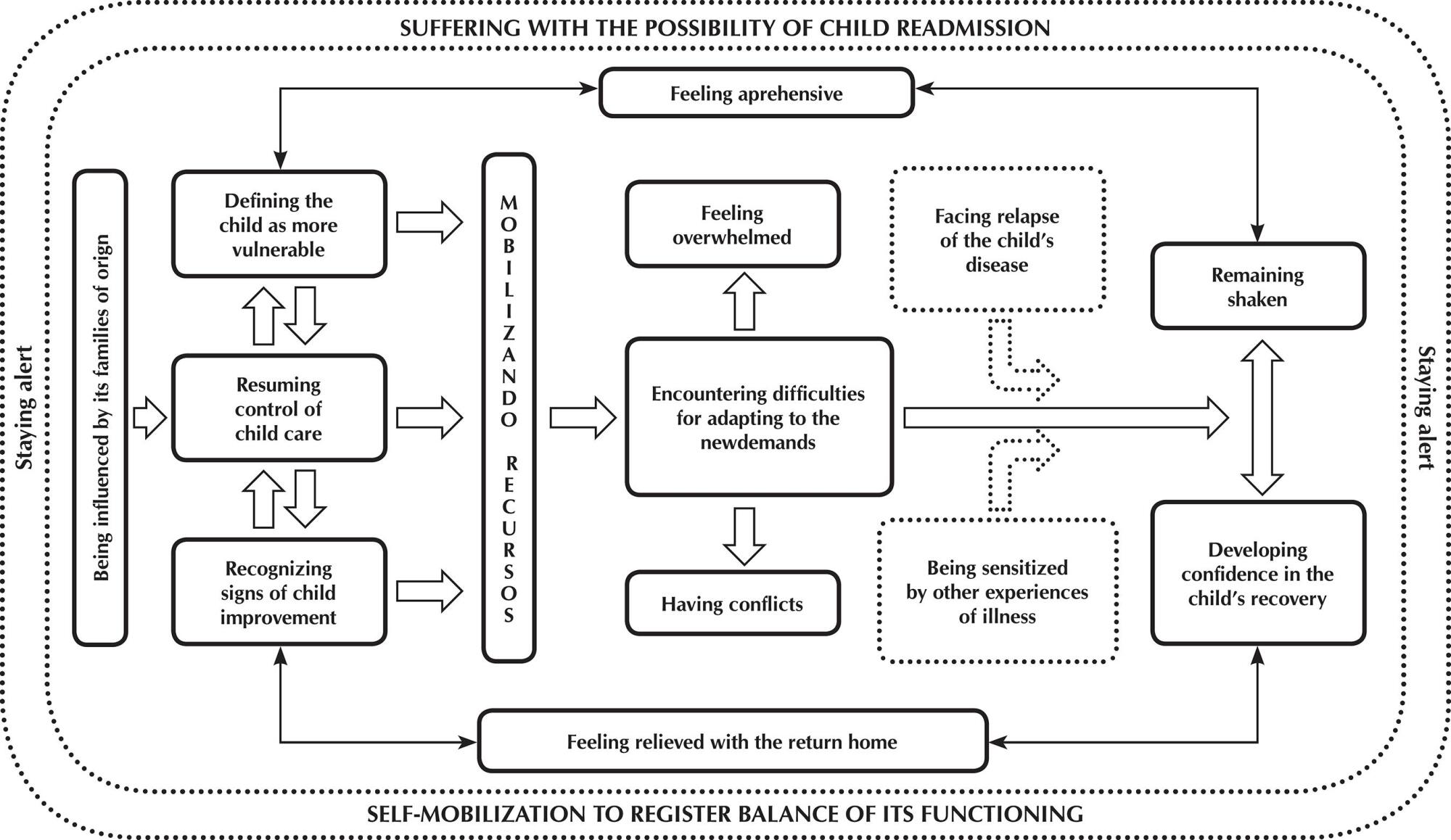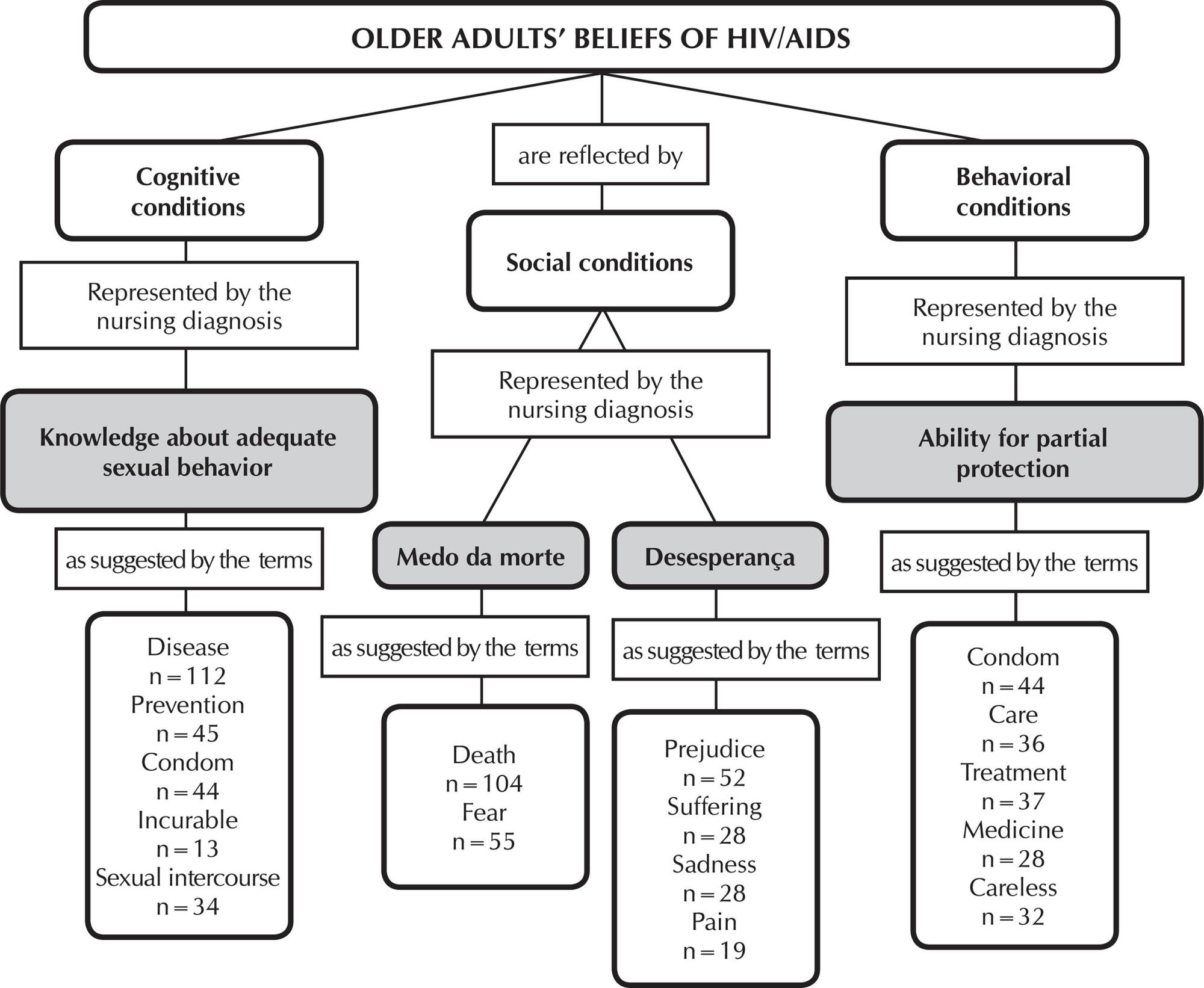-
01-01-2017
Mudança de pressão do balonete traqueal antes e depois da realização dos cuidados de enfermagem
Revista Brasileira de Enfermagem. 2017;70(6):1145-1150
Abstract
Mudança de pressão do balonete traqueal antes e depois da realização dos cuidados de enfermagem
Revista Brasileira de Enfermagem. 2017;70(6):1145-1150
DOI 10.1590/0034-7167-2016-0486
Views0See moreRESUMEN
Objetivo:
verificar los câmbios de presión del manguito traqueal antes y después de la higiene oral, elevación de la cabecera del lecho a 0º, 30º y 60º, cambio de decúbito, aspiración traqueal y baño en el lecho.
Método:
La población fue compuesta por 88 pacientes, totalizando 3696 verificaciones de julio a septiembre de 2014.
Resultados:
Los valores de presión fueron analisados em siete procedimentos de atención de enfermeira realizados em la parte de la mañana. Seis apresentaron alteraciones significativas antes y después de la realización de los procedimentos de enfermería. En el periodo de la tarde, cinco de los procedimentos de atención de enfermería realizados apresentaron alteraciones, y por la noche, sólo dos.
Conclusión:
Hubo diferencias antes y después de la realización de la atención de enfermería, demostrando alteración de la presión del manguito. El baño em el lecho y la elevación de la cabecera del lecho a 30º presentó valores de presíonmásalterados em los tres turnos de trabajo, preferentemente después del baño.
-
01-01-2017
Tracheal cuff pressure change before and after the performance of nursing care
Revista Brasileira de Enfermagem. 2017;70(6):1145-1150
Abstract
Tracheal cuff pressure change before and after the performance of nursing care
Revista Brasileira de Enfermagem. 2017;70(6):1145-1150
DOI 10.1590/0034-7167-2016-0486
Views0See moreABSTRACT
Objective:
Verify the changes of endotracheal cuff pressure before and after oral hygiene, head-of-bed elevation at 0º, 30º, and 60º, change in body position, aspiration of the endotracheal tube, and in-bed bathing.
Method:
The study sample was composed of 88 patients. We performed 3,696 checks from July to September 2014.
Results:
Pressure values were analyzed in seven nursing care in the morning. Six of them were significantly altered before and after nursing procedure. In the afternoon, five of the health care provided were altered, and in the evening, only two. Most of pressure values were below recommended.
Conclusion:
There were differences before and after health care provided, showing changes in cuff pressure. In-bed bathing and head-of-bed elevation at 30º were the ones that most altered pressure values in the three working shifts. Therefore, it is necessary to measure cuff pressure at least twice per working shift, preferably after bathing.
-
RESEARCH01-01-2017
Technical nursing students interacting with family members of hospitalized children
Revista Brasileira de Enfermagem. 2017;70(6):1137-1144
Abstract
RESEARCHTechnical nursing students interacting with family members of hospitalized children
Revista Brasileira de Enfermagem. 2017;70(6):1137-1144
DOI 10.1590/0034-7167-2016-0374
Views0See moreABSTRACT
Objective:
To understand technical nursing students’ meaning of interacting with family members of hospitalized children.
Method:
Symbolic Interactionism was used as the theoretical framework and Qualitative Content Analysis was the methodological procedure. A total of eight graduates from an institution situated in the city of Osasco, Sao Paulo state, participated in this study. Data were collected through semi-structured interviews.
Results:
A total of five representative themes were revealed: Dealing with difficult situations with family members; Perceiving oneself to be unprepared to interact with family members; Family members being a helpful tool; Developing strategies to obtain a good interaction with family members; and Teachers being facilitators of the interaction with family members.
Final considerations:
To be acquainted with this experience has led to the understanding of the need to include the theme of family care in the curriculum of the Technical Nursing Course. Additionally, the present study contributed to reflections on the importance of such knowledge for this population and to the development of future studies, as this theme has been scarcely explored in the literature.
-
RESEARCH01-01-2017
Family interview guide: strategy to develop skills in novice nurses
Revista Brasileira de Enfermagem. 2017;70(6):1129-1136
Abstract
RESEARCHFamily interview guide: strategy to develop skills in novice nurses
Revista Brasileira de Enfermagem. 2017;70(6):1129-1136
DOI 10.1590/0034-7167-2016-0072
Views0See moreABSTRACT
Objective:
describe the skills of nurses to conduct family interviews based on the Family Care Guide for Nursing Clinical Practice.
Method:
exploratory case study that analyzed the content of 16 guides applied to a child emergency service by a novice nurse from the family nursing area.
Results:
the records indicated the presence of perceptual, conceptual, and executive skills required to conduct family interviews, in particular skills for the development of genograms, therapeutic relationships, and actions to fulfill family needs.
Final considerations:
the Family Care Guide for Nursing Clinical Practice is a useful tool to guide the training processes, promote the development of family interview skills in novice nurses, and allow the cognitive consolidation of essential elements of patient- and family-centered care.
-
RESEARCH01-01-2017
Actions of nurses in early detection of breast cancer
Revista Brasileira de Enfermagem. 2017;70(6):1119-1128
Abstract
RESEARCHActions of nurses in early detection of breast cancer
Revista Brasileira de Enfermagem. 2017;70(6):1119-1128
DOI 10.1590/0034-7167-2016-0155
Views0See moreABSTRACT
Objective:
Identify the actions for early detection of breast cancer performed by nurses from basic health units; compare the compliance of these actions with the recommendations from the Ministry of Health; analyze the availability of documents to check these recommendations and analyze the association of variables “training,” “lato sensu training,” and “years of activity” of these professionals with the actions performed.
Method:
A cross-sectional study conducted with 133 nurses from 38 basic health units in the Southeast region of the municipality of São Paulo, interviewed with a validated questionnaire.
Result:
Most nurses reported actions to detect this neoplasm. Guidance on the first mammogram age was significantly associated with training, years of activity and availability of Basic Attention Book nº 13.
Conclusion:
This study observed a positive influence of training and years of activity on the actions for early detection of breast cancer and the need for adjustments in national guidelines.
-
01-01-2017
In memoriam – Irmã Maria Tereza Notarnicola
Revista Brasileira de Enfermagem. 2017;70(6):1117-1118
Abstract
In memoriam – Irmã Maria Tereza Notarnicola
Revista Brasileira de Enfermagem. 2017;70(6):1117-1118
DOI 10.1590/0034-7167.2017700601
Views0Maria Notarnicola, descendente de italianos, nasceu em São Paulo, onde realizou seus estudos primários e secundários. Ingressou na Companhia das Filhas da Caridade de São Vicente de Paulo em 1937, quando estava com quase 17 anos de idade, com o nome de Irmã Maria Tereza. Trabalhou por cinco anos na Creche Catarina Labouré, em São […]See more -
01-01-2017
In memoriam – Sister Maria Tereza Notarnicola
Revista Brasileira de Enfermagem. 2017;70(6):1117-1118
Abstract
In memoriam – Sister Maria Tereza Notarnicola
Revista Brasileira de Enfermagem. 2017;70(6):1117-1118
DOI 10.1590/0034-7167.2017700601
Views0Maria Notarnicola, of Italian descent, was born in São Paulo, where she held her primary and secondary studies. She joined the Company of the Daughters of Charity of Saint Vincent de Paul in 1937, when she was almost 17 years old, with the name of Sister Maria Tereza. She worked for five years in Catarina […]See more -
REFLECTION01-01-2017
The essence of care in health vulnerability: a Heideggerian construction
Revista Brasileira de Enfermagem. 2017;70(5):1112-1116
Abstract
REFLECTIONThe essence of care in health vulnerability: a Heideggerian construction
Revista Brasileira de Enfermagem. 2017;70(5):1112-1116
DOI 10.1590/0034-7167-2016-0570
Views0See moreABSTRACT
Objective:
Reflect on the essence of care in health vulnerability from the phenomenological perspective of Martin Heidegger.
Method:
Theoretical-reflexive study, anchored in three essential parts: 1) Care in Heidegger; 2) The essence of care in health vulnerability; And 3) Nursing care actions on health vulnerability.
Results:
Vulnerability must be recognized as an indelible trait of the human condition and has its constituents in the human being, co-presence and care. Caring is an interactive process that reveals itself in the relationship with the other. Respecting the integrity of the Being in vulnerability must be a priority in nursing care, through behaviors that privilege the Being.
Conclusion:
Understanding ontological care and its relation to vulnerability under Heidegger’s phenomenological view allowed us to uncover the facets of care in health vulnerability by adding to the nursing knowledge body a comprehensive and reflective perspective.

-
01-01-2015
Social representations about religion and spirituality
Revista Brasileira de Enfermagem. 2015;68(4):609-616
Abstract
Social representations about religion and spirituality
Revista Brasileira de Enfermagem. 2015;68(4):609-616
DOI 10.1590/0034-7167.2015680406i
Views0See moreABSTRACT
Objective:
to identify the social representations about the concepts of spirituality and religion of of health teachers.
Method:
exploratory and descriptive study, based on a qualitative approach. 25 subjects participated in it. The following instruments were used to collect data: questionnaire to identify the profile; questionnaire of free association, whose inducing words were religion and spirituality, and an interview based on the scale FICA (Puchalski, 2006).
Results:
the representations about religion and spirituality, for professors, are forged around the faith in God and it gives them meaning and purpose to deal with the challenges of personal and professional living.
Conclusion:
there are still barriers that need to be overcome with a view to a comprehensive care. For this, it is essential to incorporate spirituality in the process in the curricula of health courses.

-
01-01-2015
Prevalence and factors associated with smoking among tobacco growers in southern Brazil
Revista Brasileira de Enfermagem. 2015;68(4):603-608
Abstract
Prevalence and factors associated with smoking among tobacco growers in southern Brazil
Revista Brasileira de Enfermagem. 2015;68(4):603-608
DOI 10.1590/0034-7167.2015680405i
Views0See moreABSTRACT
Objective:
identify the prevalence and factors associated with smoking in tobacco growers.
Method:
descriptive, cross-sectional research. Data collection occurred in 2012 through household survey and interviews, including application of a structured instrument and scale Fargeström.
Results:
there were 100 growers included, average age of 46,9 ± 10,8 years; 90(90%) married; 72(72%) white, average family composition 3,7±1,1 people; median number of children 3(1-3), and the average study time 6±2,5. The prevalence of smoking among tobacco growers was 17%, which had less education (p=0.010) and fewer people in the household (p=0.049).
Conclusion:
the prevalence of smoking among tobacco growers was higher than the national average, but the nicotine dependence was low, which can facilitate the smoking cessation process. Highlights the need to implement a program to control smoking among tobacco growers.
-
01-01-2015
The family living the child recovery process after hospital discharge
Revista Brasileira de Enfermagem. 2015;68(4):594-602
Abstract
The family living the child recovery process after hospital discharge
Revista Brasileira de Enfermagem. 2015;68(4):594-602
DOI 10.1590/0034-7167.2015680404i
Views1See moreABSTRACT
Objective:
to understand the meaning attributed by the family to its experience in the recovery process of a child affected by an acute disease after discharge, and to develop a theoretical model of this experience. Symbolic interactionism was adopted as a theoretical reference, and grounded theory was adopted as a methodological reference.
Method:
data were collected through interviews and participant observation with 11 families, totaling 15 interviews. A theoretical model consisting of two interactive phenomena was formulated from the analysis: Mobilizing to restore functional balance and Suffering from the possibility of a child’s readmission.
Results:
the family remains alert to identify early changes in the child’s health, in an attempt to avoid rehospitalization.
Conclusion:
the effects of the disease and hospitalization continue to manifest in family functioning, causing suffering even after the child’s discharge and recovery.

-
01-01-2015
Multiprofessional residency in health: a document analysis of political pedagogical projects
Revista Brasileira de Enfermagem. 2015;68(4):586-593
Abstract
Multiprofessional residency in health: a document analysis of political pedagogical projects
Revista Brasileira de Enfermagem. 2015;68(4):586-593
DOI 10.1590/0034-7167.2015680403i
Views0See moreABSTRACT
Objective:
To analyze MPRH political pedagogical projects (PPP) developed in the state of São Paulo and identify scenarios that are highly favorable to IPE.
Method:
This was a descriptive exploratory study conducted through document analysis.
Results:
The analysis revealed a heterogeneous scenario regarding the curricula, didactic and pedagogical organization, educational objectives, pedagogical matrices and evaluation systems employed. One of the programs was identified as providing a highly favorable setting for IPE.
Conclusion:
The analysis adequately evaluated IPE in educational settings and found a highly favorable scenario for it, identifying didactic, pedagogical, political and organizational MPRH elements.
-
01-01-2015
Beliefs of older adults about their vulnerability to HIV/Aids, for the construction of nursing diagnoses
Revista Brasileira de Enfermagem. 2015;68(4):579-585
Abstract
Beliefs of older adults about their vulnerability to HIV/Aids, for the construction of nursing diagnoses
Revista Brasileira de Enfermagem. 2015;68(4):579-585
DOI 10.1590/0034-7167.2015680402i
Views0See moreABSTRACT
Objective:
to know the beliefs of older adults about their vulnerability to HIV/Aids, and to identify nursing diagnoses.
Method:
a field research implemented in Family Health Units, in João Pessoa, Brazil. The sample included 250 older adults of both genders with data collected from April to July of 2011. A Test of Free Word Association was applied using the term HIV/Aids. A content analysis and cross-mapping of the most frequent terms with the International Classification for Nursing Practice, 2011 were performed.
Results:
202 terms were identified in terms, with an overall frequency of 1156. Of the 202 terms, 16 were more frequent and were used to construct the nursing diagnoses. The diagnoses identified were knowledge about appropriate sexual behavior, ability for partial protection, fear of death and hopelessness.
Conclusion:
understanding these beliefs drew from knowledge about factors related to, vulnerability to HIV/Aids aimed at planning health care actions for this population segment.

-
LETTER TO THE EDITOR01-01-2015
Considerations about the manuscript published
Revista Brasileira de Enfermagem. 2015;68(4):577-577
Abstract
LETTER TO THE EDITORConsiderations about the manuscript published
Revista Brasileira de Enfermagem. 2015;68(4):577-577
DOI 10.1590/0034-7167.20156804c
Views0Re: Chinese auriculotherapy to improve quality of life of nursing team To the Editor,[…]See more -
01-01-2015
Research in nursing and new pathways based on SENPE
Revista Brasileira de Enfermagem. 2015;68(4):571-572
Abstract
Research in nursing and new pathways based on SENPE
Revista Brasileira de Enfermagem. 2015;68(4):571-572
DOI 10.1590/0034-7167.2015680401i
Views1Almost half a century after the beginning of nursing research in Brazil, there is still a need for investment before it can be considered consolidated. The truth of this statement can be seen in the national seminars that discuss research in the field through 17 events that present results and participation of nursing researchers and […]See more
-
01-01-2015
Quality of life and physical activity in intensive care professionals from middle São Francisco
Revista Brasileira de Enfermagem. 2015;68(1):26-31
Abstract
Quality of life and physical activity in intensive care professionals from middle São Francisco
Revista Brasileira de Enfermagem. 2015;68(1):26-31
DOI 10.1590/0034-7167.2015680104i
Views0See moreObjective:
the objective was to assess the level of physical activity (LPA) and the quality of life QL of the professionals who work in ICU.
Method:
this was a cross-sectional study carried out in Adult ICUs. LPA was assessed by the International Questionnarie of Physical Activity – short form (IQPA-SF) and the QL by the Medical Outcomes Study 36 (SF-36) questionnaire.
Results:
it was classified active 50.89% out of a total of 59 professionals. Nursing technicians were considered the most active with 60.6%. The QL of the professionals who were considered active were better when compared to inactives, with statistical differences to the category of physical aspects limitation, social aspects and mental health. The working hours were higher than recommend, the physicians were higher than the physical therapist, nurses and technicians nurses (p = 0.046).
Conclusion:
physically active professionals who work in ICU had higher quality of life probably why have lower hours of work and consequently more free time to engage in physical activity.

-
01-01-2015
Learning needs of Nursing students in technical vocational education
Revista Brasileira de Enfermagem. 2015;68(1):20-25
Abstract
Learning needs of Nursing students in technical vocational education
Revista Brasileira de Enfermagem. 2015;68(1):20-25
DOI 10.1590/0034-7167.2015680103i
Views0See moreObjective:
identify learning needs of students of Technical Vocational Education (TVE) in Nursing. Qualitative study conducted in a city of São Paulo state.
Method:
the subjects were students, teachers and coordinators of TVE and students of the bachelor degree who have had contact with TVE. Data collection was performed by questionnaire socioeconomic and cultural circles about the learning needs. For data analysis we used the content analysis.
Results:
it was found that students have difficulties contents not related to nursing as portuguese and mathematics, as well as introductory courses in the course of TVE which possibly may interfere negatively in learning specific content of nursing and the quality of health care.
Conclusion:
it is necessary to rethink the content taught and ways to teach from basic education, as well as the training of teachers who now works in the TVE.
-
01-01-2015
Serious game e-Baby: nursing students’ perception on learning about preterm newborn clinical assessment
Revista Brasileira de Enfermagem. 2015;68(1):13-19
Abstract
Serious game e-Baby: nursing students’ perception on learning about preterm newborn clinical assessment
Revista Brasileira de Enfermagem. 2015;68(1):13-19
DOI 10.1590/0034-7167.2015680102i
Views0See moreObjective:
to evaluate students opinion regarding e-Baby educational technology.
Methodology:
exploratory descriptive study in which participated a sample composed of 14 nursing Portuguese students that used e-Baby digital educational technology in an extracurricular course. To achieve the aim of the study, the data collection was realized through an opinion instrument in Likert scale including the possibility of commentaries by students. Is was also collected data of participants’ characterization.
Results:
students made very satisfactory evaluations regarding the game e-Baby, varying since usability acceptation through suggestions of expansion of the game to other nursing themes.
Conclusion:
serious game e-Baby can be considered a didactic innovation and motivator tool of learning. Besides, it demonstrates have adequate interface in design and educative function aspects, evocating intense interaction between user and computational tool.

-
01-01-2015
Challenges beyond the scientific knowledge production
Revista Brasileira de Enfermagem. 2015;68(1):7-8
Abstract
Challenges beyond the scientific knowledge production
Revista Brasileira de Enfermagem. 2015;68(1):7-8
DOI 10.1590/0034-7167.2015680101p
Views0For several decades, innumerous appeals and reflections on how to build the nursing science and achieve visibility in the scientific world led researchers to make efforts to produce knowledge that contributed to the well-being of people, improving their quality of life, relieving their suffering and transforming the reality in which we live. In addition to […]See more
Search
Search in:
Nuvem de Tags
Adolescente (85) Atenção Primária à Saúde (239) COVID-19 (91) Criança (91) Cuidados de Enfermagem (269) Educação em Enfermagem (151) Educação em Saúde (139) Enfermagem (930) Enfermagem Pediátrica (86) Estudantes de Enfermagem (77) Estudos de Validação (131) Família (87) Idoso (208) Promoção da Saúde (99) Qualidade de Vida (104) Saúde do Trabalhador (86) Saúde Mental (145) Saúde Pública (82) Segurança do Paciente (150) Tecnologia Educacional (100)



